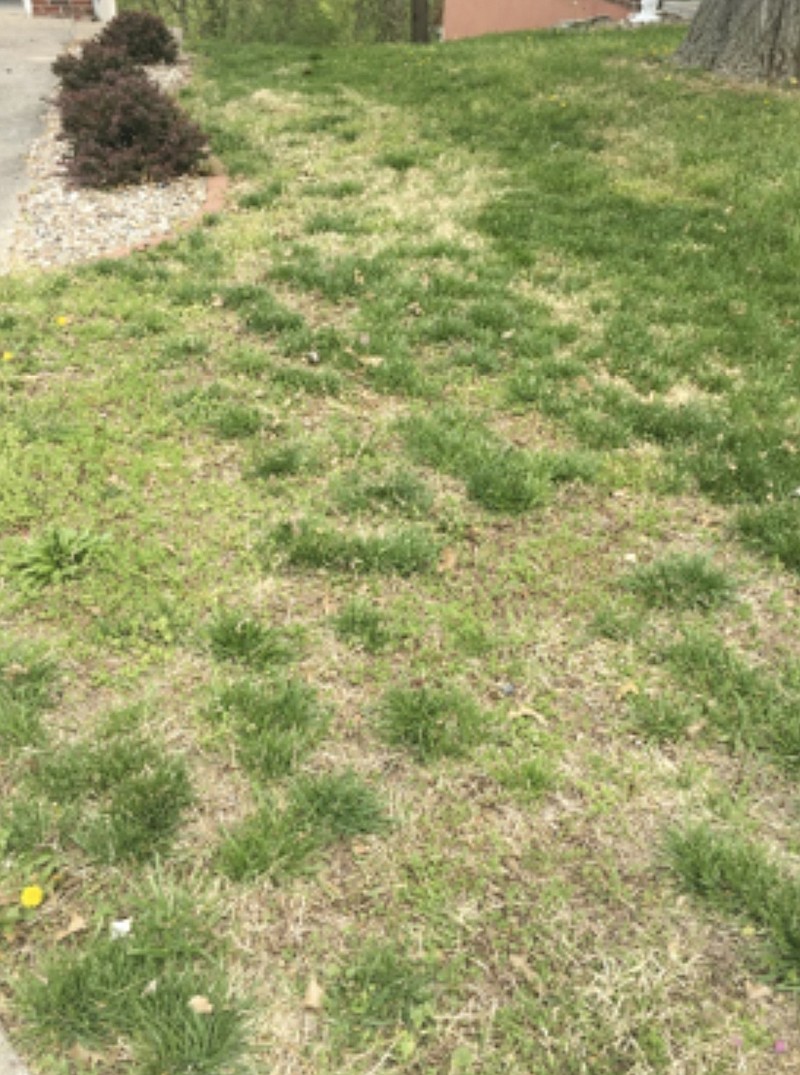Q: When I was cleaning up some flower and vegetable beds for planting, I saw a lot of this gray mold. Will it harm my plants? I've seen some before, but this year there is so much, why?
A: Gray mold on growing plants is a very different pathogen than a similar looking mold that occurs on leaf litter after a long wet winter. This latter mold is more correctly referred to as leaf mold and grows on dead plant matter. While it shouldn't cause any problems to your new plants, tilling the ground and letting it "air out" in sunny and dry conditions is likely helpful and certainly not harmful.
Why is there so much this year? Because we just had the fifth wettest winter on record, the most since 1984-85. Winter in this situation is the three months of December, January and February.
Q: This is how my lawn came back after the winter (see photo). Can I do anything to improve it this late into the spring?
A: Well it is a bit late to renovate your cool season lawn this year. The only option for this spring would be to kill the bad areas and lay sod.
Assuming you might want another option, just mow it this year and plan on renovating it this fall. I am glad you are going to submit a soil sample. When at our extension center, please pick up the publication on "Cool season grasses: lawn maintenance calendar." While it does have a section about renovation in it, we have an additional publication that has more detail on that subject, "Cool-Season Grasses: Lawn Establishment and Renovation." Please review both and let me know if you have questions.
Q: I have some fruit trees and heard you had a schedule developed on spraying them. Is that true? If so, how do I get it?
A: That is true, and it is based on our MU Extension publication Fruit Spray Schedules for the Homeowner, extension.missouri.edu/p/G6010. To get a copy, please send an email to our extension center and I'll get it to you.
Q: I've heard reports that herbicides with glyphosate is bad for your health. I would be interested in using something else, but can't figure out what would work. I do a lot of spot spraying with it around various bushes, flowers and vegetables. Any suggestions?
A: Yes, this active ingredient that made the weed killer Roundup famous, has been in the news due to a couple of court cases, and is now featured on some TV product malfeasance ads running on minor channels or late at night. You are right to be puzzled on what one might switch to, because any product that does a similar job has its own set of problems.
On the phone you mentioned a customer service agent suggested 2, 4-D combined with a grass killer (like Poast). Yes this would kill about any or all plants. However, 2, 4-D is NOT suitable for applying nearby most bushes, flowers and vegetables. It is highly prone to harming adjacent plants (especially tomatoes), more so when we have hot and humid conditions. Any products similar to 2, 4-D have a similar constraint.
For home gardeners, this leaves contact "burn-down" products. These herbicides damage living tissue, but are not systemic thus do not kill "into the roots." They often have to be applied two times and do not work as well on perennial weeds (like dandelion) and even less so on woody plants (if they have any bark formed). There are a number of these available, but they probably aren't carried by most area retailers. They can be ordered online. There are organic and conventional options, examples being:
- Avenger Organic Weed Killer, biodegradable, non-toxic - Concentrate 32 ounces ($34 for 32 ounces, makes about 1 gallon)
- Scythe Herbicide ($180 for 2.5 gallons, makes about 100 gallons).
While I have never used either of the examples referenced, they both have EPA labels detailing how to use on what weeds to obtain desired results. Small spray droplets from them would burn or spot up that foliage, but as they are not systemic, wouldn't be as harmful as glyphosate to those desirable plants.

